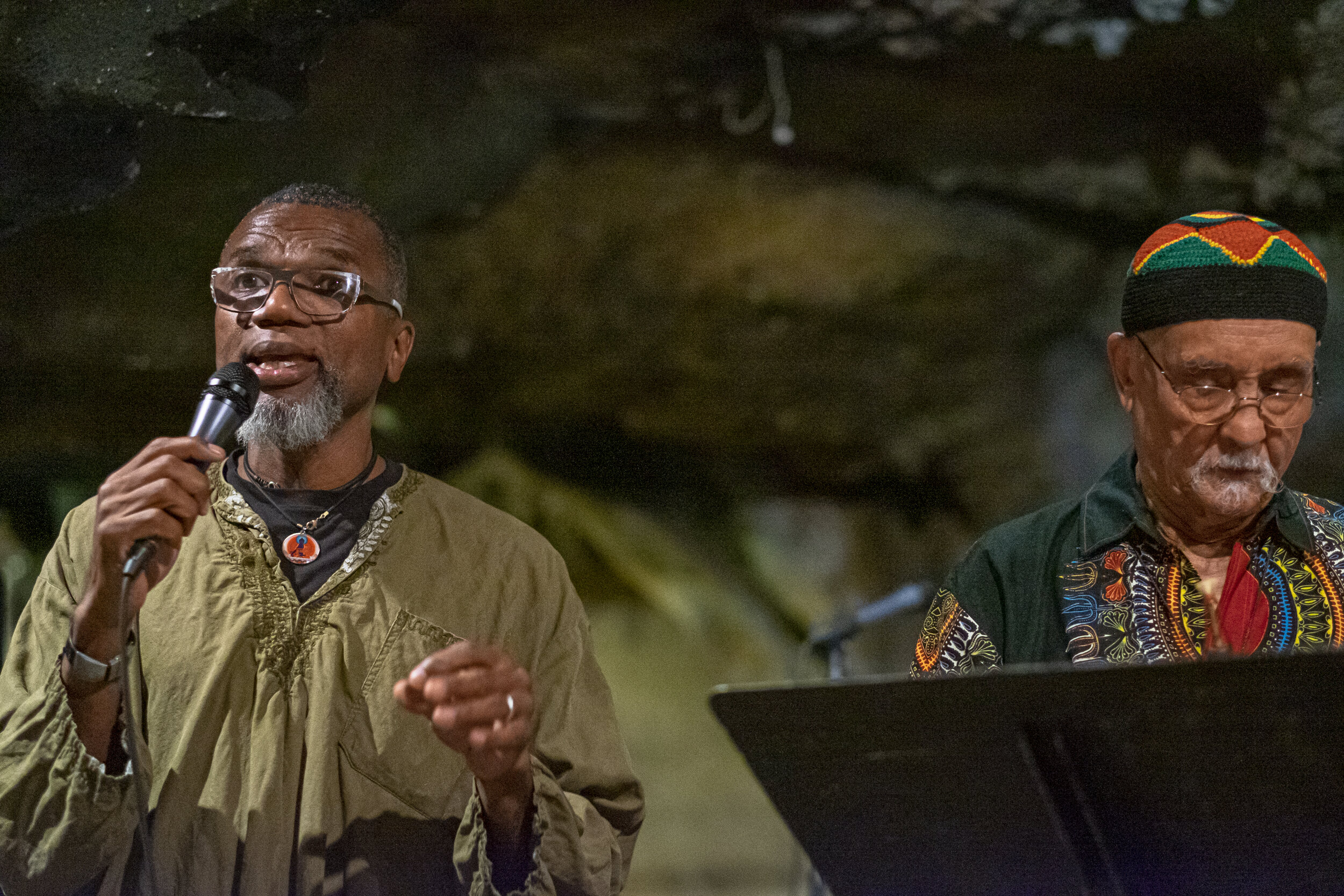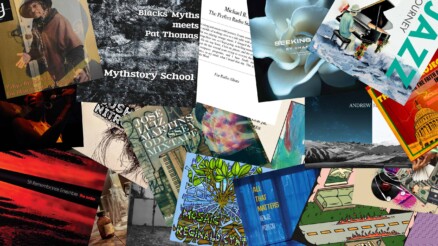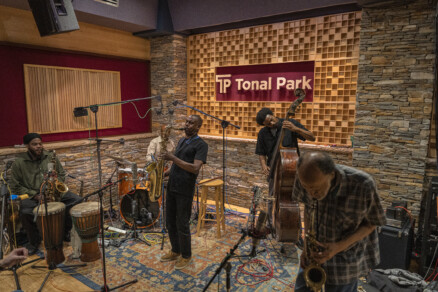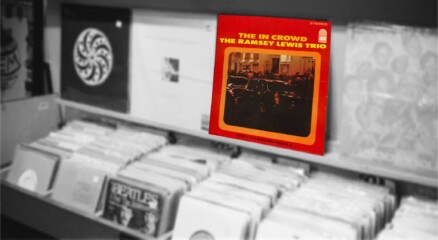‘New Sounds, New Energies’: Transparent Productions kicks off its 25th season

“Sundays at Seven at the Caverns.” In recent years, that phrase had been a rallying cry and a sound of invitation for lovers of free jazz and creative music throughout the Beltway region. That’s because it was the tagline for Transparent Productions’ series at Bohemian Caverns, where listeners had a chance to witness some of the most imaginative, breathtaking music to arrive in the city.
The series, which lasted until the Caverns’ closure in 2016, represents just one chapter in Transparent Productions’ multi-decade history of bringing challenging and inspiring improvisers and composers to the District. This Saturday, with the launch of its first live series since the start of the coronavirus pandemic, Transparent is celebrating its 25th year. In a city where improvised music venues tend to come and go — forcing Transparent’s shows to move from one venue to another every few years — it’s no small accomplishment.
Transparent Productions was started in 1997 by radio presenters and avant-garde music advocates Bobby Hill, Herb Taylor, Larry Appelbaum and Thomas Stanley – all of whom were then on-air hosts for WPFW 89.3 FM – and fellow enthusiast Vince Kargetis. They saw themselves as carrying on the legacy of Bill Warrell’s d.c. space – a legendary spot for alternative music that hosted acts from Sun Ra and Anthony Braxton to Fugazi and Henry Rollins, but closed its doors in 1991 – and District Curators’ music series, which had been the only viable outlet for free jazz and creative music in D.C. In recent years, Bobby Hill has increasingly shouldered the responsibility for curating, promoting and organizing Transparent’s concert series.
“Once d.c. space and District Curators wasn’t happening, there wouldn’t be any other place to do that, unless somebody jumped up,” Hill told CapitalBop in a recent phone interview, recalling his group’s founding. “We decided to be the crew to jump up and make it happen.”
Transparent Productions routinely brings some of legends of the avant-garde jazz world to D.C., including saxophonist David Murray, pianist Angelica Sanchez and pianist Satoko Fujii, as well as representatives of its new vanguard, like guitarist Mary Halvorson and pianist Craig Taborn. Perhaps Transparent’s most consistently popular presentation is the annual visit of Kahil El-Zabar’s Ethnic Heritage Ensemble, which over the years has routinely packed whatever house it’s in.
Transparent Productions kicks off its 25th anniversary season at Rhizome DC on Sunday, Sep. 12, with violinist, violist and composer Jason Kao Hwang’s Human Rites Trio. The first half of the season will run through Dec. 12, when the powerhouse bassist Michael Formanek gives a rare solo performance. Other shows taking place this fall will include drum-turntable duets, tributes to avant-garde icons and simply a lot of the most interesting music you can hear in the District this fall.
CapitalBop spoke to Hill this week about Transparent Productions’ 25th season kickoff, in an attempt to wrap our minds around the history of this crucial organization in the D.C. music scene. You can find tickets to the upcoming season’s shows at Rhizome’s website; tickets to each show cost $20, and all are planned to be outdoors. This interview has been edited for length and clarity.
CapitalBop: What was the origin of Transparent Productions?
Bobby Hill: We were all programmers on radio. District Curators was ending what they do; and they were doing music like this for 20 years. Bill Warrell was making a change in what he did and this was his last, full season. So, we decided that someone needs to step in and try to keep this thing going. There were four programmers at WPFW – myself, Herb Taylor, Larry Applebaum and Thomas Stanley – then Vince Kargetis joined us as well from the community. We got together and talked about what we could do and decided what we could do was this – Transparent – and we talked about how we wanted to make it happen and we made it happen.
CB: Where did that name “Transparent Productions” come from?
BH: I was just thinking about that! I think we were just kind of brainstorming words and someone mentioned that and we all said, ‘Yeah, that’s perfect. “Transparent,” let’s stay out of the way. Let’s just present the music and kind of be transparent to what we’re offering, and just make it happen.”
CB: And to circle back briefly, for those who may not know, District Curators was a similar outfit run by Bill Warrell?
BH: Yes! He still has District Curators; I think the focus is more on film now, though Bill is starting to present jazz again at his space, the Firehouse, known as Outer Space. But Bill was doing that forever, and we were going to see great stuff there. Some of the greatest music that ever happened in D.C., beyond Transparent now — because we’ve put it together for a little while too — Bill did it. People came to see it and the music was supported. They were all at d.c. space, but Bill would present at other places as well: the Hirschhorn, the Smithsonian from time to time, and a few other places. But yes, mostly at d.c. Space at 7th and E Street.
CB: Why was it important to carry on that work and to form Transparent Productions?
BH: The importance of forming Transparent Productions was to keep the artist presentations going: for the artists to make money, to serve a public, so to speak, and for the people who did this kind of stuff to have an opportunity to hear it. And there wasn’t any opportunities to hear it once District Curators stopped doing their thing. Once d.c. space and District Curators wasn’t happening, there wouldn’t be any other place to do that, unless somebody jumped up. We decided to be the crew to jump up and make it happen.
CB: Take us back to that first season in 1997. Who and where were you presenting?
BH: My first concert was Michael Bisio and Joe McPhee and that was at a place on 16th Street or 18th Street – I can’t remember the name. That was our first presentation and it happened well. People came out in big numbers, the musicians loved having the opportunity to present to people who dug their music and I think they appreciated the opportunity to get the door: Everything that came through the door was theirs, so they just had to play good music and spread the word about the performance, which we were doing in D.C. We were all on the air, we all had shows to talk about it, we all had lives to share it with and that’s what we did.
CB: I think a lot of our readers will remember your presentations at Bohemian Caverns but talk about where you’ve presented over the years. What kinds of space did you use?
BH: Food for Thought is the name I couldn’t think of. That’s a place on Connecticut Avenue, I’m not sure if it’s still there or not. I do know Food for Thought’s food has transitioned with Damian to the Black Cat. [Editor’s note: the Food For Thought cafe at the Black Cat closed in 2018 when the Black Cat downsized.] We presented there, we presented at George Washington University, we presented at Mr. Henry’s, we had a long stay a Sangha Peace and Trade Space in Takoma Park. We presented in their first location, which was on Maple Avenue, a block away from the current Rhizome, then they moved to another space that is next to WOWD, the radio station that I am at now, but they were there before WOWD got there. Now we’re in our final space, hopefully for the time being: Rhizome. We’ll be there at least until December and we have concerts scheduled through December. We’re looking forward to that, and to the next phase. If Rhizome does go away, we have to move on elsewhere.
CB: The landscape of Washington, D.C. has changed so much in the time you’ve been presenting shows, especially in the last 10 years. Does that make the work more difficult?
BH: It has not made it harder to present because it hasn’t changed how we present. We still do the kind of things that we do. We still put things out low-end, low-rent; just emails and paper flyer passing-out, that kind of thing. We still have support on the radio stations: WOWD and WPFW, and they’ll sometimes talk to artists and always talk about our concerts. We still use community radio; we still use community events to pass out fliers; we still do our announcements on the internet. We know things have changed, we know spaces are being lost and spaces are hard to get, but we’ve been lucky enough to have homes that people are aware of and we put the word out and they come. We’re not trying to get 3,000 people into our spaces but we get some good numbers from time to time, some numbers that the artists say are really some of their best concerts that they’ve done; not just performance-wise, but in terms of what they get back from it.
CB: I remember a performance from right before the pandemic by Kahil El-Zabar’s Ethnic Heritage Ensemble at Rhizome and I was up on the staircase because it was so packed that night.
BH: Packed like normal, huh?! That’s how we do man, that’s how we do. Folks come out – if you make it available, folks come find it. They found us, which is a great thing.
CB: Why do you thinks folks come find it?
BH: Larry Applebaum has program on WPFW called “The Sound of Surprise,” and I really like that phrase: It’s really what’s happening with what we do. People come out to hear the set and they know they’re going to hear something uniquely different from what they normally hear. It won’t be standards or anything close to it. It’s going to be a fresh experience, from a listening standpoint, every time when they come to our performances. I think folks appreciate that.
CB: What attracted you to this music, to free jazz? What importance does it have for you?
BH: “This! Music” is the name of my radio program too. [Laughs] It is a valued music, very important. I think it shapes; I think avant-garde jazz has shaped jazz throughout its life. It’s been what forced it to think about different ways of doing things and those things still exist. People are doing it by rote, in many respects, and we want to get out of the rote and come up with new sounds, new energies. That’s what Transparent does.
CB: How do you go about curating the series, who are you looking for? Is it based on things like if artists have new records, or more open than that?
BH: I wouldn’t say it’s about a new record. We appreciate the opportunity to support an artist that has a new record and present them: No doubt, we love that! But that’s not what we’re looking for, a brand-new record. We’re looking for an artist or a collection of artists that present the kind of music the way that we appreciate it: free, open and original and jazz. I mean, ‘jazz,’ the word itself, is weird, but some concept of jazz. You know, we’re not doing free bluegrass — but we would! Frankly we would, that would be kind of fun.
CB: Talk about this 25th season. What are you looking forward to?
BH: We’ve got a nice start. We kick things off this coming Sunday with Jason Kao Hwang, a very gifted violinist, violist and composer. He’s going to open us up with his ensemble which features some good folk: drummer Andrew Drury and bassist Ken Filiano. So, that will kick things off. Then we continue on Sep. 26 with Turning Jewels Into Water, this is the kind of things we do that wouldn’t be presented anywhere else. Ravish Momin, a very gifted electronic drummer – a very gifted drummer in general, but he plays electronic drums – and Val Jeanty plays turntables. Turntables and drum duet, you don’t see that too often. We follow with a performance by Fay Victor – she opened up our 24th season – and she’s going to come back her NoiseFUNK trio, which is a great trio with Joe Morris on guitar – great to have him back, he’s performed with us a few times – Sam Newsome on reeds and Reggie Nicholson, the gifted drummer that we haven’t presented in a number of years. That is going to be preceded by a duet performance by the wonderful Luke Stewart on bass [CapitalBop’s director of presenting and co-founder] and Fay Victor on vocals. That is on Oct. 24.
We continue on Friday, we have a rare Friday performance – most of our performances are on Sundays, we used to say ‘Sundays at Seven at the Caverns’ the couple years we presented at Bohemian Caverns – November 5th, they’re calling it BLUIETT 21 and it is going to be a tribute to Hamiet Bluiett and bassist Dominic Duval. Hamiet Bluiett being one of the greatest baritone saxophonists ever in jazz music and Dominic Duval a very gifted double bassist we lost a couple years ago as well; good to be able to pay tribute to them. That will be a trio featuring Michael Bisio on bass, Joe McPhee on reed and Joe Giardullo on piano and reeds. Then coming up on Sunday, December 5th, Tim Berne will be presenting a performance with drummer Nasheet Waits. Tim Berne did our last concert before the 2020 coronavirus closure, so it will be good to have Tim back with the wonderful Nasheet Waits on drums. Then we end this season on Sunday, Dec.. 12 with a solo bass performance by bassist Michael Formanek. Michael is a wonderful bassist; I don’t think he’s performed solo often and he’s got a new solo recording. So, in a sense, this pushes that but it is Mike doing his thing.
That is how we end this calendar year in December and we’re working now to try and put together a second half of our 25th season, which would be through January to June, or so. We’ve talked about some things but nothing we can put on paper yet. We’re just happy to present what we got and feel fortunate to do this still.
CB: What do you think about when you reflect on the fact that this is your 25th season?
BH: I’m proud of it. It’s crazy when you think about it, that we’ve been here this long doing it, and we’re still doing it. I’m very happy that we are. It is great to get to 25 years of anything that you do and 25 years of presenting this music in the D.C. area, with folks coming out to support it. It’s a good thing and we look forward to doing more. We really do.




